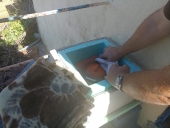When I think of summer, I think of foods with the following qualities: light, wet, crunchy, cold, fruity, sour, bright. So going outward from that, and thinking about what I have on hand (or can make with what I have on hand), I think adding pickled vegetables and tart, light condiments (like vinegars or fruit sauces) would inject a little sunshine into heavy meals.
I'm hooked on homemade grape molasses right now. It's just grape juice (Concord, with the tartaric acid already precipitated out) reduced down to a thin syrup. I use it like I would balsamic vinegar. Just this month I've used it on roasted mixed vegetables, in a marinade for pork chops, and on toast (with plain butter or, even better, miso butter).
I did a lot of fermenting this fall, and eating the pickles as a side dish or a mix-in has really been perking things up. I do a lot of things with a kind of kimchi flavor profile, and there's just something about the combination of ginger, garlic, and apple that add the right kind of aromatics to cut through the fartiness of cabbage and radishes while bringing out the sweet and fresh elements of carrot or onion.
Honorable mention: sliced carrots and onions, lightly salted and put in the fridge overnight (Japanese quick-pickling, more or less), then dressed with a light fruit or herbal vinegar.





